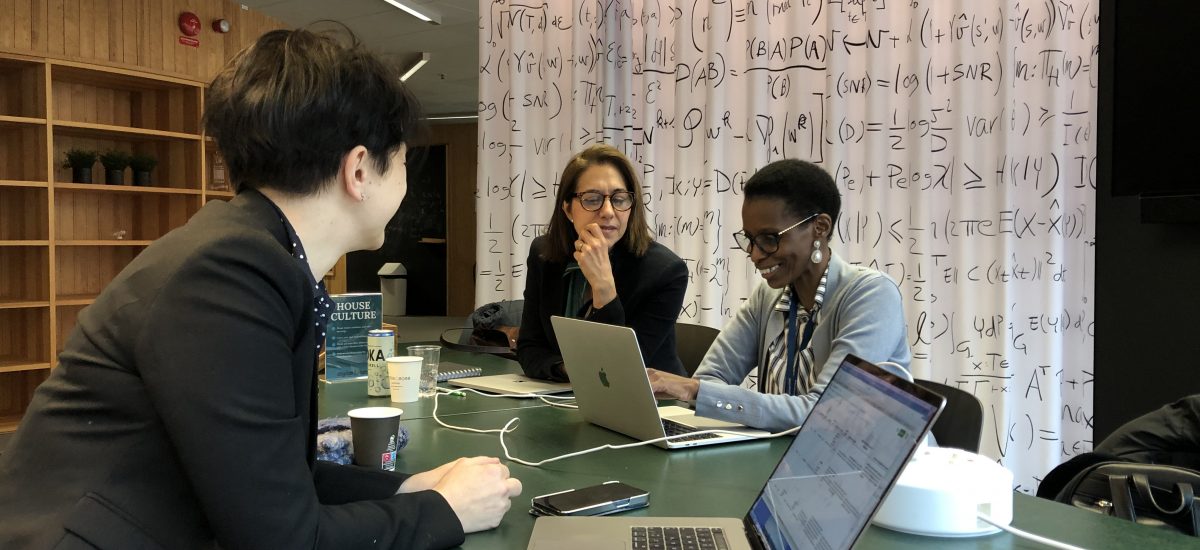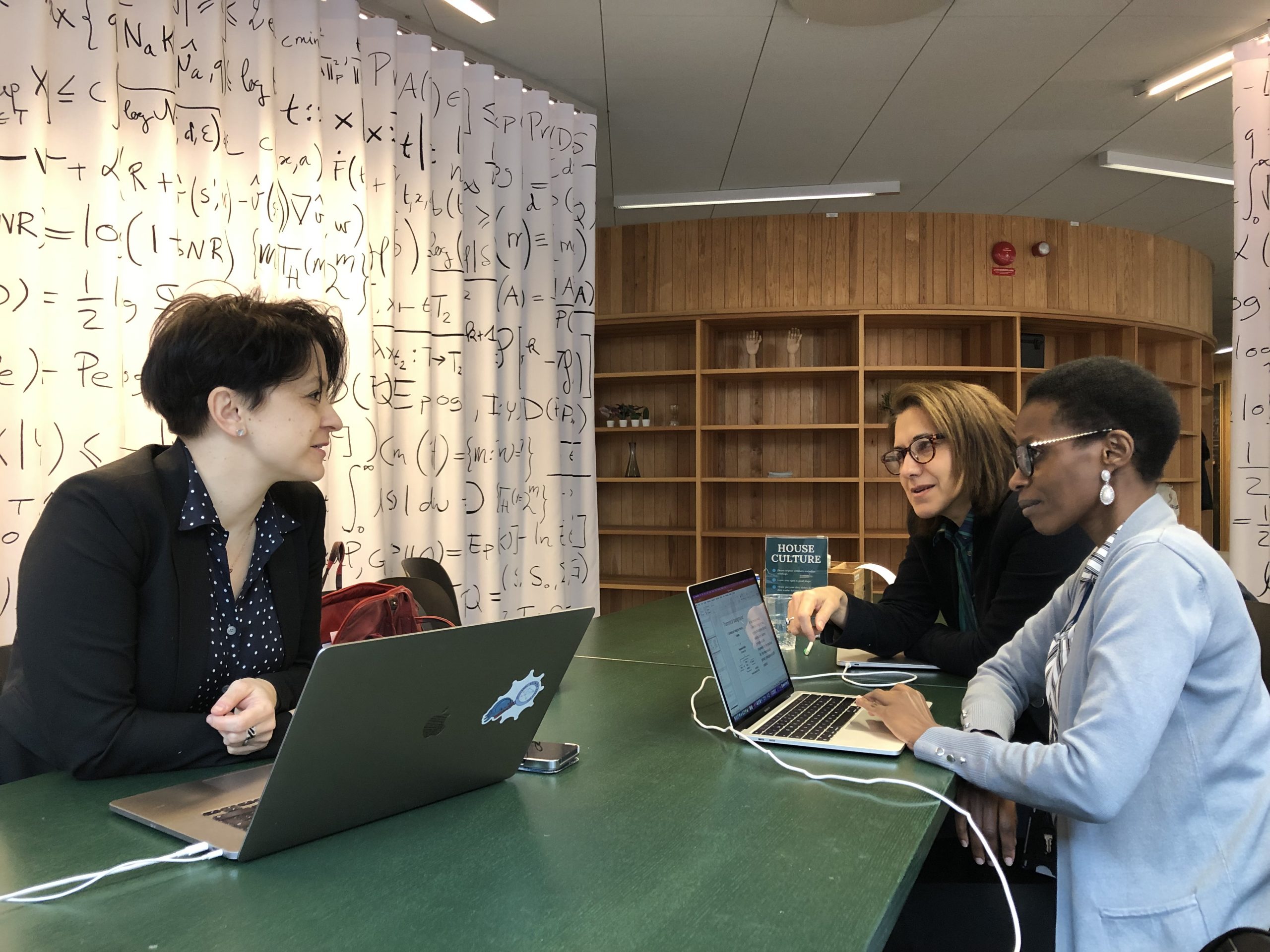
Chantal Mutimukwe: Privacy is also about power, and dignity, and to lose it may threaten the human being.
On 8 March, the world celebrates International Women’s Day. At Digital Futures, we have a number of excellent female researchers, and Chantal Mutimukwe is one of them.
Chantal Mutimukwe is a postdoc researcher at the Department of Computer Systems and Sciences (DSV), Stockholm University. Before joining Stockholm University, she worked at the KTH Royal Institute of Technology. Chantal got her PhD in informatics from Örebro University in 2019.
Her PhD research concerned the protection of information privacy in an e-government context. The main research goal was to provide an understanding of how the practices of information collection and dissemination by government organizations can match with the protection of citizens’ privacy.

Hi Chantal, describe your role(s) as a Postdoc Fellow at Digital Futures and why you applied for this fellowship mobility program?
– I am a postdoc researcher at Stockholm University, working on the project on Ethical and Legal Challenges of AI-driven practices in Higher Education, funded by WASP-HS. I mainly work on the privacy issues in relation to the use of online proctoring systems in higher education. I have a Ph.D. in Information Systems, and my research interests lie in the area of ethical challenges concerning the use of AI, mainly focusing on data privacy, trust, people’s behavior, and responsibility. I applied for the Digital Futures fellowship because of the opportunity to fulfill my dreams of pursuing an academic career and the possibilities to connect with experienced national and international researchers from different universities and disciplines.
Today is International Women’s Day, and your supervisors are both women. Your Main supervisor is Teresa (Tessy) Cerratto-Pargman, Professor, Human-Computer Interaction (HCI) at Stockholm University. Your Co-supervisor is Olga Viberg, Associate Professor at, the Division of Media Technology and Interaction Design at KTH. What has this meant for you?
– It means a lot. In a few words, it gives a sense of women’s empowerment, competence, and value in society. Beyond that, our research collaboration reflects women’s ability to support, cooperate and empower each other.
Teresa and Olga, what advice would you give a young female researcher of today? Have things changed since you started your own career? Let’s start with you, Tessy.
– A lot has changed since I started my career. The academic system has become much more competitive today, and young researchers are under a lot of pressure to publish in premier venues and perform excellence on many fronts. In this environment, it can sometimes be difficult for someone who starts a career in academia to focus on how one develops professionally and personally in relation to oneself and how one contributes to building community on a research issue.
My advice will be to avoid comparisons with others and concentrate on analyzing your professional and personal development instead. Am I spending time with the communities and colleagues that inspire me? From which communities and colleagues am I learning the most? These questions may orient young researchers to establish and cultivate strong ties with those they feel can have an engaged, sincere, intellectually challenging conversation on a topic. In a field like ours, where we look at digital and emerging technologies, it is central for anyone not conforming to the traditional image of a computer scientist or researcher interested in computers to build community.
In my experience, it is in the community we can find support and the strength to deal with complex research issues and an academic system that still needs to become more inclusive and pluralistic.
Olga, what is your advice?
– Thank you for this question. My advice will be to always believe in your dreams by working stepwise in a direction that continuously develops you as a researcher and a human being. Also, do not be afraid to fail occasionally; every failure is a new start that takes you further. Moreover, always stand up for yourself in situations that may be experienced as challenging. There are always colleagues around you who will support you! Finally, enjoy your academic path, which brings a lot of opportunities and positive experiences!
Chantal, the title of your postdoc project is Privacy of online proctoring systems in higher education settings – tell us a bit about it. Why is this research important?
– Higher education institutions are continuing to adopt online proctoring systems (OPS) as an effective way to deserve academic integrity in online learning. These systems are becoming the “new normal” in the higher education context. On the other hand, using online proctoring systems is associated with privacy problems that can lead higher education institutions to deal with ethical considerations that are not always well defined, identified and discussed. This calls researchers and practitioners to cooperate in developing new insights, conditions, and practices into how these tools might be put into practice. My research is necessary because it aims to provide a comprehensive understanding of privacy issues around using OPS and how these can be addressed in higher education.
Have you already some results from your work? How could this result be used?
– This first study of my research presented a model exploring students’ information privacy concerns by considering OPS and the global context of learning analytics. The model considers privacy concerns as a central construct between two antecedents—perceived privacy risk and perceived privacy control, and two outcomes—trusting beliefs and non-self-disclosure behaviours. The second study provides a comprehensive understanding of the context of online proctoring in higher education by exploring the different data attributes, identifying the key stakeholders, their privacy perceptions, and their responsibilities towards privacy practices. This understanding is necessary to develop practices that can sustain the responsible adoption and use of online proctoring tools in higher education.
Here are the references of my articles for more details:
- Mutimukwe, C., Viberg, O., Oberg, L.-M., & Cerratto-Pargman, T. (2022). Students’ privacy concerns in learning analytics: Model development. British Journal of Educational Technology, 53(4), 932–951. https://doi.org/https://doi.org/10.1111/bjet.13234
- Mutimukwe, C., Han, S., Viberg, O., & Cerratto-Pargman, T. (2023). Privacy as Contextual Integrity in Online Proctoring Systems in Higher Education: A scoping review. Proceedings of the 56th Hawaii International Conference on System Sciences, 74–82. https://hdl.handle.net/10125/102638
Your primary research interest is data privacy and security protection in an online service context – why did you decide to focus on these topics?
– The use of online services and other digital tools is associated with collecting and storing large amounts of information about people. This creates increased concerns and dilemmas about information privacy, security, and surveillance, influencing how the public sector in particular maintains trust as more and more services are digitalized. Further, I consider privacy as a human right. Privacy is also about power, and dignity, and to lose it may threaten the human being.
Finally, tell us a little bit about yourself!
– Humm! I love spending time with my children! I also love nature and simple things such as walking in the forest, hearing birdsongs, seeing dappled sunlight, etc. I came from Rwanda, and living in a flourishing country like Sweden gives me the joy to carry on the life journey.


